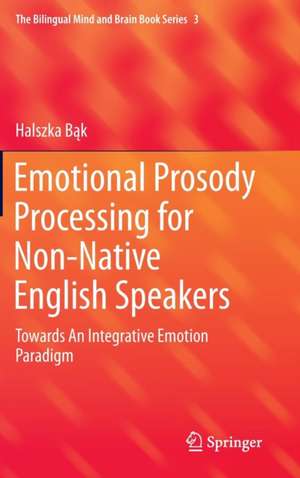Emotional Prosody Processing for Non-Native English Speakers: Towards An Integrative Emotion Paradigm: The Bilingual Mind and Brain Book Series, cartea 3
Autor Halszka Bąken Limba Engleză Hardback – 9 sep 2016
Crucially, Emotional Prosody Processing for Non-Native English Speakers: Towards an Integrative Emotion Paradigm begins by providing a conceptual background of emotion research, and then demonstrates a novel, workable, completely integrative paradigm for emotion research. This integrative approach reconciles theories such as the dimensional view of emotions, the standard basic emotions view, and the appraisal view of emotions. Following this theoretical section is an empirical exploration of the topic: the volume explores those views via experimental tasks. The insight into overall processing such a multiple-level approach allows a comprehensive answer to the question of how non native speakers of English process emotional prosody in their second language. By offering a critical, data-driven, integrative approach to investigating emotions in the minds of non-native English speakers, this volume is a significant and timely contribution to the literature on emotion prosody processing, bilingual research, and broadly understood emotion research.
| Toate formatele și edițiile | Preț | Express |
|---|---|---|
| Paperback (1) | 383.71 lei 43-57 zile | |
| Springer International Publishing – 15 iun 2018 | 383.71 lei 43-57 zile | |
| Hardback (1) | 391.02 lei 43-57 zile | |
| Springer International Publishing – 9 sep 2016 | 391.02 lei 43-57 zile |
Preț: 391.02 lei
Nou
Puncte Express: 587
Preț estimativ în valută:
74.82€ • 78.33$ • 61.91£
74.82€ • 78.33$ • 61.91£
Carte tipărită la comandă
Livrare economică 07-21 aprilie
Preluare comenzi: 021 569.72.76
Specificații
ISBN-13: 9783319440415
ISBN-10: 3319440411
Pagini: 138
Ilustrații: XIX, 197 p. 9 illus.
Dimensiuni: 155 x 235 x 14 mm
Greutate: 0.49 kg
Ediția:1st ed. 2016
Editura: Springer International Publishing
Colecția Springer
Seria The Bilingual Mind and Brain Book Series
Locul publicării:Cham, Switzerland
ISBN-10: 3319440411
Pagini: 138
Ilustrații: XIX, 197 p. 9 illus.
Dimensiuni: 155 x 235 x 14 mm
Greutate: 0.49 kg
Ediția:1st ed. 2016
Editura: Springer International Publishing
Colecția Springer
Seria The Bilingual Mind and Brain Book Series
Locul publicării:Cham, Switzerland
Cuprins
Chapter 1 Emotional relativity – argument from nurture.- Chapter 2 Emotion universals – argument from nature.- Chapter 3 Linguistics – the great absentee.- Chapter 4 A different look at emotion processing models.- Chapter 5 The state of emotional prosody research – A meta-analysis.- Chapter 6 The development of stimuli for emotional prosody research. With contributions from Prof Dr. Jeanette Altarriba, State University of New York, Albany, USA- Chapter 7 Emotional prosody processing in non-native English speakers.- Chapter 8 Emotional prosody processing for non-native English speakers.- Appendix 1.- Appendix 2.
Notă biografică
Dr. Halszka Kinga Bąk received her PhD in 2015 from the Faculty of English at Adam Mickiewicz in English and Cognition. Previously, she has received her MA in English, Experimental Pragmatics, and an MA in Russian Language, Pragmatics.
Textul de pe ultima copertă
This volume provides the first systematic and data-driven exploration of English emotional prosody processing in the minds of non-native speakers of the language. Over the past few decades emotional prosody has attracted the interest of researchers from a variety of disciplines such as psychiatry, neuropsychology, psycholinguistics, and linguistics. Although a considerable collective body of empirical evidence exists regarding emotional prosody processing in native speakers of various languages, non-native speakers have been virtually ignored. This constitutes a knowledge gap of increasing relevance, as we approach 2050, the year when the global population of non-native speakers of English is estimated to overtake that of native speakers of the language. This volume aims to fill this gap and provide insights into how emotions are processed on multiple levels while also presenting novel methodological solutions.
Crucially, Emotional Prosody Processing for Non-Native English Speakers: Towards an Integrative Emotion Paradigm begins by providing a conceptual background of emotion research, and then demonstrates a novel, workable, completely integrative paradigm for emotion research. This integrative approach reconciles theories such as the dimensional view of emotions, the standard basic emotions view, and the appraisal view of emotions. Following this theoretical section is an empirical exploration of the topic: the volume explores those views via experimental tasks. The insight into overall processing such a multiple-level approach allows a comprehensive answer to the question of how non native speakers of English process emotional prosody in their second language. By offering a critical, data-driven, integrative approach to investigating emotions in the minds of non-native English speakers, this volume is a significant and timely contribution to the literature on emotion prosody processing, bilingual research, and broadly understood emotion research.
Crucially, Emotional Prosody Processing for Non-Native English Speakers: Towards an Integrative Emotion Paradigm begins by providing a conceptual background of emotion research, and then demonstrates a novel, workable, completely integrative paradigm for emotion research. This integrative approach reconciles theories such as the dimensional view of emotions, the standard basic emotions view, and the appraisal view of emotions. Following this theoretical section is an empirical exploration of the topic: the volume explores those views via experimental tasks. The insight into overall processing such a multiple-level approach allows a comprehensive answer to the question of how non native speakers of English process emotional prosody in their second language. By offering a critical, data-driven, integrative approach to investigating emotions in the minds of non-native English speakers, this volume is a significant and timely contribution to the literature on emotion prosody processing, bilingual research, and broadly understood emotion research.
Caracteristici
Demonstrates a new, viable integrative paradigm for emotion research Addresses emotional prosody in non-native English speakers in a communicative interpersonal context Provides a contemporary account of the state of emotion processing research, including both anthropological and psychological approaches Includes supplementary material: sn.pub/extras








